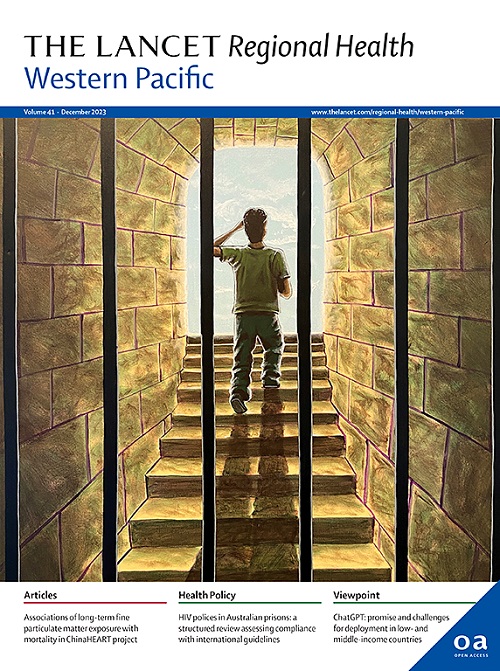Adherence to the ABC (atrial fibrillation better care) pathway and risk of adverse outcomes in patients with chronic kidney disease: a report from the prospective APHRS-AF registry
IF 8.1
1区 医学
Q1 HEALTH CARE SCIENCES & SERVICES
引用次数: 0
Abstract
Background
Limited data exist on the effectiveness of the ABC (Atrial Fibrillation Better Care) pathway in reducing adverse events in Asian patients with atrial fibrillation (AF) and chronic kidney disease (CKD).
Methods
A post-hoc analysis of the prospective APHRS AF Registry. Patients were divided into CKD (eGFR < 60 ml/min) and non-CKD (eGFR ≥ 60 ml/min) groups. Logistic regression assessed factors associated with CKD, oral anticoagulant (OAC) use, and rhythm control strategies. Cox regression estimated hazard ratios (HRs) for a composite outcome of all-cause mortality and major adverse cardiovascular events. Subgroup analyses evaluated outcomes by CKD severity and ABC adherence.
Findings
Of 3550 patients, 1029 had CKD (mean age 75.3 ± 10.3 years, 40.3% female), and 2521 did not (66.4 ± 11.3 years, 32.3% female). CKD patients were older, more often female, had lower ABC adherence (29.5% vs. 42.1%, p < 0.001) and anticoagulation use (Odds Ratio [OR] 0.77, 95% CI 0.61–0.96), but higher warfarin use, and were less likely to receive rhythm control (OR 0.79, 95% CI 0.66–0.94) comparing to those without CKD. CKD and adherence to the ABC pathway were independently associated with higher (HR 1.90, 95% CI 1.46–2.48) and lower (HR 0.64, 95% CI 0.48–0.87) risks of the composite outcome, respectively. Adverse event risks increased with CKD severity, and ABC pathway benefits were observed irrespective of CKD.
Interpretation
AF patients with CKD show lower ABC pathway adherence and high risk of adverse events. Improving adherence to integrated care approaches may improve prognosis in this patient group.
Funding
This study was an independent research grant by Pfizer and Bristol Myers Squibb (BMS) to APHRS.
慢性肾病患者坚持ABC(房颤更好治疗)途径和不良结局风险:一份来自前瞻性APHRS-AF登记的报告
背景:在亚洲房颤(AF)和慢性肾脏疾病(CKD)患者中,ABC(房颤更好的护理)途径在减少不良事件方面的有效性数据有限。方法对前瞻性aprs AF登记进行事后分析。将患者分为CKD (eGFR;60 ml/min)和非ckd (eGFR≥60 ml/min)组。Logistic回归评估了与CKD、口服抗凝剂(OAC)使用和节律控制策略相关的因素。Cox回归估计了全因死亡率和主要不良心血管事件复合结局的风险比(hr)。亚组分析通过CKD严重程度和ABC依从性来评估结果。结果:在3550例患者中,1029例患有CKD(平均年龄75.3±10.3岁,女性占40.3%),2521例无CKD(平均年龄66.4±11.3岁,女性占32.3%)。CKD患者年龄较大,多为女性,ABC依从性较低(29.5%比42.1%,p <;0.001)和抗凝使用(优势比[OR] 0.77, 95% CI 0.61-0.96),但与没有CKD的患者相比,华法林使用较多,接受心律控制的可能性较小(OR 0.79, 95% CI 0.66-0.94)。CKD和ABC通路的依从性分别与复合结局的较高(HR 1.90, 95% CI 1.46-2.48)和较低(HR 0.64, 95% CI 0.48-0.87)风险独立相关。不良事件风险随着CKD严重程度的增加而增加,ABC通路的益处与CKD无关。CKD患者表现出较低的ABC通路依从性和较高的不良事件风险。提高对综合护理方法的依从性可能改善该患者组的预后。本研究是辉瑞和百时美施贵宝(BMS)对APHRS的一项独立研究资助。
本文章由计算机程序翻译,如有差异,请以英文原文为准。
求助全文
约1分钟内获得全文
求助全文
来源期刊

The Lancet Regional Health: Western Pacific
Medicine-Pediatrics, Perinatology and Child Health
CiteScore
8.80
自引率
2.80%
发文量
305
审稿时长
11 weeks
期刊介绍:
The Lancet Regional Health – Western Pacific, a gold open access journal, is an integral part of The Lancet's global initiative advocating for healthcare quality and access worldwide. It aims to advance clinical practice and health policy in the Western Pacific region, contributing to enhanced health outcomes. The journal publishes high-quality original research shedding light on clinical practice and health policy in the region. It also includes reviews, commentaries, and opinion pieces covering diverse regional health topics, such as infectious diseases, non-communicable diseases, child and adolescent health, maternal and reproductive health, aging health, mental health, the health workforce and systems, and health policy.
 求助内容:
求助内容: 应助结果提醒方式:
应助结果提醒方式:


